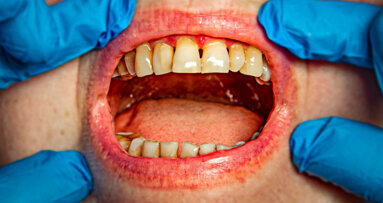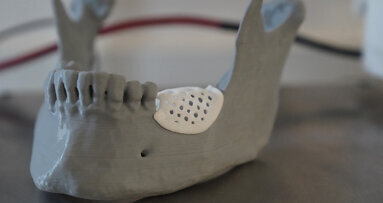HALLE (SAALE)/LEIPZIG, Germany: A new approach to the treatment of periodontitis could make the use of antibiotics obsolete, as it targets only the bacteria that cause the disease while sparing those that are harmless. It has been developed as a result of a collaboration between the Martin Luther University Halle-Wittenberg (MLU), the Fraunhofer Institute for Cell Therapy and Immunology IZI in Leipzig and PerioTrap Pharmaceuticals in Halle. The researchers expect the new method of treatment to cause few side effects.
To date, the treatment of periodontitis has mainly involved the use of broad-spectrum antibiotics that combat all the bacteria in the oral cavity. However, according to one of the lead authors of the study, Dr Mirko Buchholz from PerioTrap Pharmaceuticals, this has some disadvantages. “One side effect of the treatment is that it also destroys all the harmless or beneficial bacteria in the oral cavity. In addition, the bacteria can ultimately develop resistance to the antibiotics,” he explained in an MLU press release.
In order to find a method of eliminating only the harmful bacteria, the research team developed a test substance that combats glutaminyl cyclase, a specific enzyme of the bacteria that plays an important role in metabolism. The underlying idea was that inactivating the enzyme would damage the bacteria and prevent the development of periodontitis.
The developed substance was tested for effectiveness in different clinics and universities in Switzerland, Poland and the US and was found to successfully suppress the growth of pathogenic bacteria.
Prof. Milton T. Stubbs, the other lead author of the study and a biotechnologist at MLU, explained the different variants of the researched enzyme: “Our target, glutaminyl cyclase, comes in two different variants. Normally, plants and bacteria have one variant of the enzyme and mammals another. The two variants work in a similar fashion, but they differ significantly in their structure. It’s a bit like flat-tip versus Phillips screwdrivers.”
To the surprise of the researchers, the bacteria that cause periodontitis possess the mammalian variant of the enzyme. “This is crucial for our approach because it gives us a possible target so we only kill the pathogenic bacteria and leave the harmless ones intact,” said Buchholz. According to Stubbs, the research team found small but significant differences between the bacterial enzymes and the human variant. These differences are probably sufficient for the new substance not to affect the human enzymes, which is why only minor side effects are expected.
The researchers concluded that the study findings demonstrate that glutaminyl cyclase is a promising target for the development of drugs to be used in the treatment of periodontitis and associated diseases. Further in vitro and in vivo studies are necessary, and it may, therefore, take some years before the research results in a marketable drug.
The study, titled “Mammalian-like type II glutaminyl cyclases in Porphyromonas gingivalis and other oral pathogenic bacteria as targets for treatment of periodontitis”, was published online on 5 January 2021 in the Journal of Biological Chemistry, ahead of inclusion in an issue.
Tags:
SINGAPORE: The Association of Orthodontists (Singapore) Congress (AOSC) has reinforced its status as a leading event for orthodontic professionals with a ...
MINNEAPOLIS, U.S.: Scientists have frequently linked some forms of periodontal disease with other inflammatory diseases, and now a new study has suggested ...
BRISBANE, Australia: A team of biomedical researchers at the University of Queensland in Brisbane have undertaken a groundbreaking study that demonstrates ...
LONDON, UK: The discussion around a link between periodontitis and hypertension is not new. Acknowledging this and the fact that there is still not enough ...
AARHUS, Denmark: The effect a high-sugar diet can have on teeth is well documented; however, the effect it can have on periodontal health has not been as ...
CAMBRIDGE, Mass., US: Most wearable electronics are worn on the skin, and intra-oral devices are rare. Researchers at Massachusetts Institute of ...
PORTOVIEJO, Ecuador: The application of the concept of osseointegration revolutionised the treatment of edentulous patients. However, as applications ...
KUOPIO, Finland: Stroke is the second leading cause of death globally, and periodontitis has been shown to be associated with an increased risk of ischemic ...
JERUSALEM, Israel: It has been previously established that adults who have undergone cancer treatment may have dental anomalies. However, no research to ...
AARHUS, Denmark: Smoking can greatly affect periodontitis treatment—these are the findings of a recent study that investigated the influence of different ...
Live webinar
Tue. 24 February 2026
1:00 pm EST (New York)
Prof. Dr. Markus B. Hürzeler
Live webinar
Tue. 24 February 2026
3:00 pm EST (New York)
Prof. Dr. Marcel A. Wainwright DDS, PhD
Live webinar
Wed. 25 February 2026
11:00 am EST (New York)
Prof. Dr. Daniel Edelhoff
Live webinar
Wed. 25 February 2026
1:00 pm EST (New York)
Live webinar
Wed. 25 February 2026
8:00 pm EST (New York)
Live webinar
Tue. 3 March 2026
11:00 am EST (New York)
Dr. Omar Lugo Cirujano Maxilofacial
Live webinar
Tue. 3 March 2026
8:00 pm EST (New York)
Dr. Vasiliki Maseli DDS, MS, EdM



 Austria / Österreich
Austria / Österreich
 Bosnia and Herzegovina / Босна и Херцеговина
Bosnia and Herzegovina / Босна и Херцеговина
 Bulgaria / България
Bulgaria / България
 Croatia / Hrvatska
Croatia / Hrvatska
 Czech Republic & Slovakia / Česká republika & Slovensko
Czech Republic & Slovakia / Česká republika & Slovensko
 France / France
France / France
 Germany / Deutschland
Germany / Deutschland
 Greece / ΕΛΛΑΔΑ
Greece / ΕΛΛΑΔΑ
 Hungary / Hungary
Hungary / Hungary
 Italy / Italia
Italy / Italia
 Netherlands / Nederland
Netherlands / Nederland
 Nordic / Nordic
Nordic / Nordic
 Poland / Polska
Poland / Polska
 Portugal / Portugal
Portugal / Portugal
 Romania & Moldova / România & Moldova
Romania & Moldova / România & Moldova
 Slovenia / Slovenija
Slovenia / Slovenija
 Serbia & Montenegro / Србија и Црна Гора
Serbia & Montenegro / Србија и Црна Гора
 Spain / España
Spain / España
 Switzerland / Schweiz
Switzerland / Schweiz
 Turkey / Türkiye
Turkey / Türkiye
 UK & Ireland / UK & Ireland
UK & Ireland / UK & Ireland
 Brazil / Brasil
Brazil / Brasil
 Canada / Canada
Canada / Canada
 Latin America / Latinoamérica
Latin America / Latinoamérica
 USA / USA
USA / USA
 China / 中国
China / 中国
 India / भारत गणराज्य
India / भारत गणराज्य
 Pakistan / Pākistān
Pakistan / Pākistān
 Vietnam / Việt Nam
Vietnam / Việt Nam
 ASEAN / ASEAN
ASEAN / ASEAN
 Israel / מְדִינַת יִשְׂרָאֵל
Israel / מְדִינַת יִשְׂרָאֵל
 Algeria, Morocco & Tunisia / الجزائر والمغرب وتونس
Algeria, Morocco & Tunisia / الجزائر والمغرب وتونس
 Middle East / Middle East
Middle East / Middle East












































To post a reply please login or register